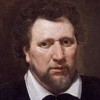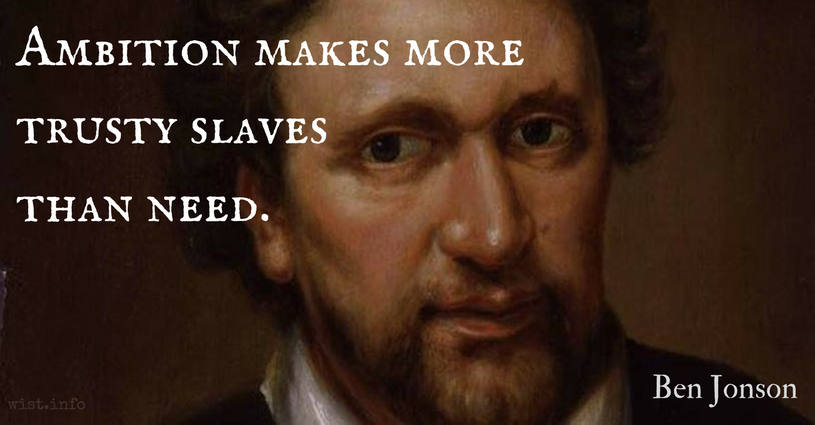Whilst that for which all virtue now is sold,
And almost every vice, almighty gold ….Ben Jonson (1572-1637) English playwright and poet
“Epistle to Elizabeth, Countess of Rutland” (1599)
(Source)
Reprinted in The Forest, Poem 12.
Quotations by:
Jonson, Ben
They that love Mirth, let them heartily Drink,
‘Tis the only Receipt to make Sorrow sink.Ben Jonson (1572-1637) English playwright and poet
“Private Entertainment of the King and Queen,” Highgate, London (1604-05-01)
(Source)
Receipt and recipe (both from the Latin recipe "you take this!") were originally used in English for medical formulations and prescriptions. "Receipt" was often abbreviated "Rt," which, as a ligature, looks like "℞" or "Rx" -- which is still used as an abbreviation a medical prescription.
No man is so foolish but he may sometimes give another good counsel, and no man so wise that he may not easily err if he takes no other counsel than his own. — He that is taught only by himself has a fool for a master.
Ambition makes more trusty slaves than need.
Farewell, thou child of my right hand, and joy!
My sin was too much hope of thee, loved boy.
Seven years thou wert lent to me, and I thee pay,
Exacted by thy fate, on the just day.
O, could I lose all father now. For why
Will man lament the state he should envy?
To have soon ‘scaped world’s and flesh’s rage,
And, if no other misery, yet age!
Rest in soft peace, and, asked, say here doth lie
Ben Jonson his best piece of poetry:
For whose sake, henceforth, all his vows be such,
As what he loves may never like too much.
Ill fortune never crushed that man whom good fortune deceived not.
Ben Jonson (1572-1637) English playwright and poet
The Works of Ben Jonson, Second Folio, ‘Timber, or Discoveries Made upon Men and Matter”, “Fortuna” (1640)
(Source)
Wisdom without honesty is mere craft and cozenage.
Ben Jonson (1572-1637) English playwright and poet
Timber, or Discoveries Made upon Men and Matter (1641)
(Source)
They say princes learn no art truly, but the art of horsemanship. The reason is, the brave beast is no flatterer. He will throw a prince as soon as his groom.
Ben Jonson (1572-1637) English playwright and poet
Timber, or Discoveries Made upon Men and Matter, para. 95 “Illiteratus Princeps” (1641)
From an aphorism by the Greek philosopher Carneades, quoted in by Montaigne, Essays, Book 3, ch. 7 "Of the Incommodity of Greatness" (1588): "Princes' children learnt nothing aright but to manage and ride horses; forsomuch as in all other exercises every man yieldeth and giveth them the victory; but a horse, who is neither a flatterer nor a courtier, will as soon throw the child of a king as the son of a base porter."
Sir, calumnies are answer’d best with silence.


